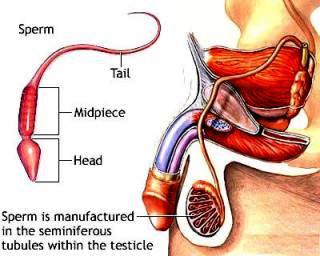Infertility- Causes and Treatments
The major causes of infertility are
divided into several categories and are discussed in detail
throughout our Web site:
-
 Male
factor Infertility- Some degree of male factor is present in
approximately 50% of infertile couples and occurs when the male
cannot produce and ejaculate a sufficient number of sperm that can
reach, penetrate and fertilize an egg. Male factor is a major
cause of infertility. Male
factor Infertility- Some degree of male factor is present in
approximately 50% of infertile couples and occurs when the male
cannot produce and ejaculate a sufficient number of sperm that can
reach, penetrate and fertilize an egg. Male factor is a major
cause of infertility.
-
Ovarian Factor Infertility- The ovary
contains a full complement of eggs at birth and an egg develops
within an ovarian follicle during each menstrual cycle. Sometimes,
ovulation does not occur (an ovulation) or is irregular (oligoovulation)
and is most often due to hormonal imbalances. Polycystic ovarian
disease is a common cause of infertility. Some medical treatments
such as chemotherapy or high dose radiation therapy can damage the
ovary. Additionally, some women are born with eggs that do not
fertilize properly for unknown reasons. Ovarian factor is present
in approximately 30% of sub fertile females.
-
Endometriosis- Endometriosis is a
major cause of infertility and can be present with or without
symptoms. Endometriosis occurs when the cells that normally line
the endometrium enter the pelvic cavity and adhere to internal
organs. Endometriosis can penetrate, obstruct, and otherwise
damage organs such as the tubes, ovaries and uterus. The presence
of endometriosis also causes an inflammatory response which can
impair fertility.
-
Cervical Factor Infertility- Sperm
travel through the cervical fluid, where they are nourished and
supported, to reach the uterus. Sometimes the female's immune
system mistakenly identifies the sperm as invading pathogens
(virus, bacteria, etc.) and seeks to destroy them in an antigen
antibody reaction. The mucus must also be of the appropriate
consistency to facilitate sperm passage.
-
Tubal Factor Infertility- If the
tubes are damaged, the eggs cannot travel from the follicles to
the site of fertilization at the end of the fallopian tubes.
Damage to the tubes may occur from pelvic inflammatory disease,
endometriosis, genetic abnormalities or other causes.

-
Uterine Factor- Rarely, a woman may
be born with structural abnormalities of the uterus that prevent
implantation of the embryo and support of the developing fetus. In
many cases, these conditions can be treated surgically; however,
sometimes a surrogate mother must be used to carry the fetus to
term.
-
Idiopathic or Unknown Factors- In a
significant percentage of cases, no specific cause for a couple's
infertility can be identified. This does not mean there is no
cause; rather, science has not advanced to the point where it can
be identified.
Fortunately, the majority of conditions
causing infertility can be effectively treated medically or
surgically. Most women become pregnant using first line therapies
such as medication and/or intrauterine insemination. When these
therapies fail, assisted reproductive technologies such as IVF are
often indicated.
IVF has given new hope to thousands of
couples who otherwise could not produce a genetically related child.
With technologies such as IVF with intracytoplasmic sperm injection
(ICSI), men with severe sperm defects can now father children.
Perhaps the most important step a
couple can take is to see a specialist early in the course of their
treatment. As females' age, egg "quality" can decline, sometimes
precipitously, in a very short time. It is critically important that
women in their thirties consult a reproductive endocrinologist as
soon as possible.
 Top
Top |

